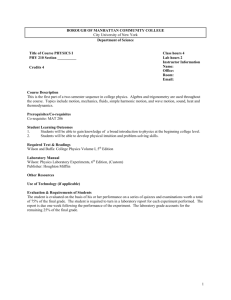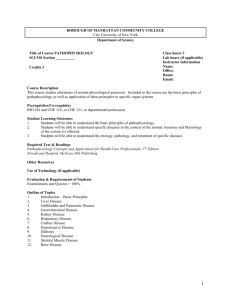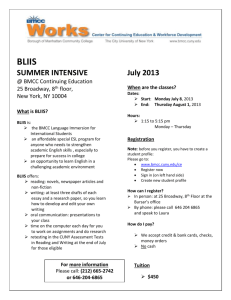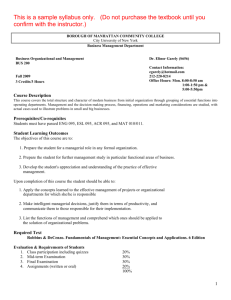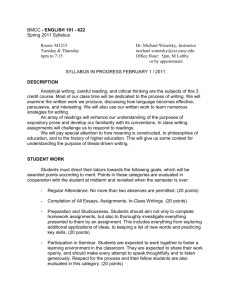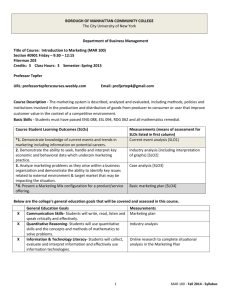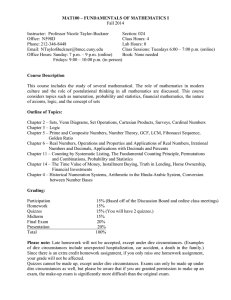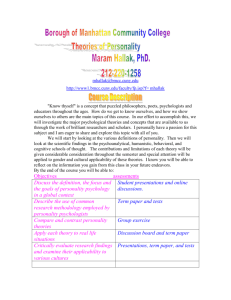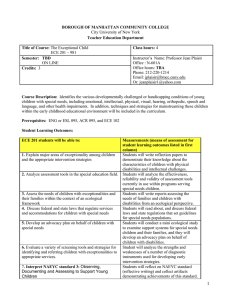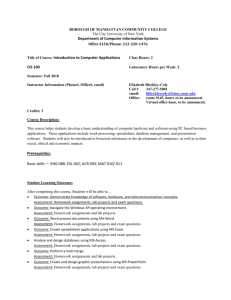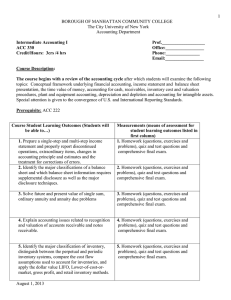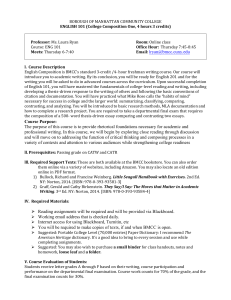BOROUGH OF MANHATTAN COMMUNITY COLLEGE Department of Science
advertisement
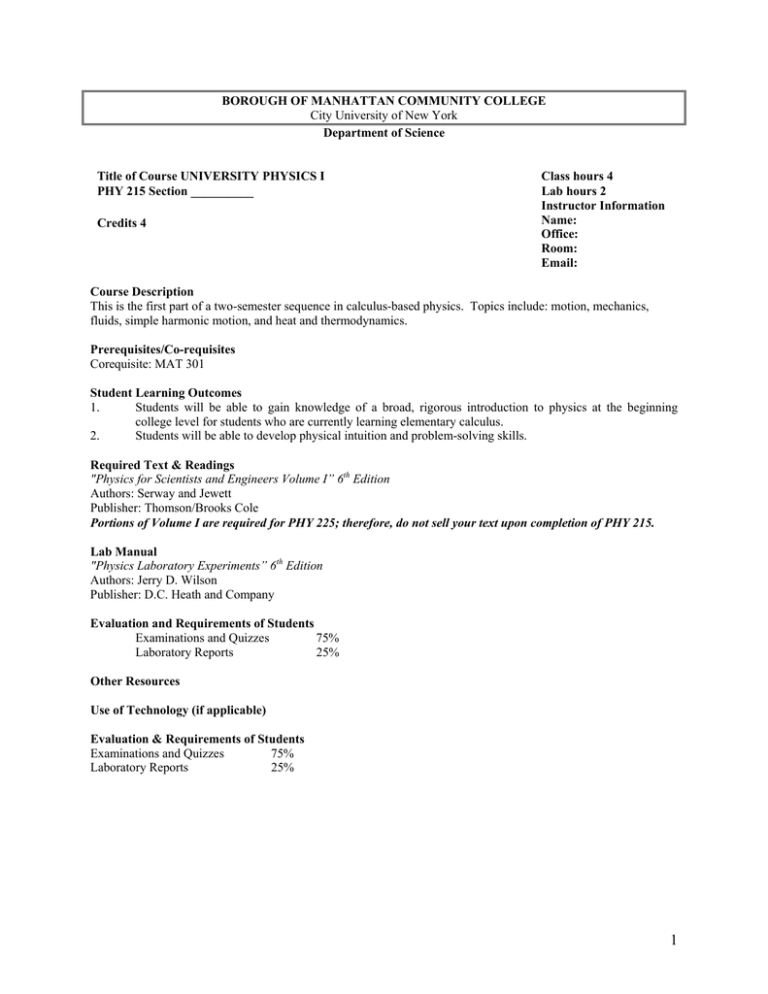
BOROUGH OF MANHATTAN COMMUNITY COLLEGE City University of New York Department of Science Title of Course UNIVERSITY PHYSICS I PHY 215 Section __________ Credits 4 Class hours 4 Lab hours 2 Instructor Information Name: Office: Room: Email: Course Description This is the first part of a two-semester sequence in calculus-based physics. Topics include: motion, mechanics, fluids, simple harmonic motion, and heat and thermodynamics. Prerequisites/Co-requisites Corequisite: MAT 301 Student Learning Outcomes 1. Students will be able to gain knowledge of a broad, rigorous introduction to physics at the beginning college level for students who are currently learning elementary calculus. 2. Students will be able to develop physical intuition and problem-solving skills. Required Text & Readings "Physics for Scientists and Engineers Volume I” 6th Edition Authors: Serway and Jewett Publisher: Thomson/Brooks Cole Portions of Volume I are required for PHY 225; therefore, do not sell your text upon completion of PHY 215. Lab Manual "Physics Laboratory Experiments” 6th Edition Authors: Jerry D. Wilson Publisher: D.C. Heath and Company Evaluation and Requirements of Students Examinations and Quizzes 75% Laboratory Reports 25% Other Resources Use of Technology (if applicable) Evaluation & Requirements of Students Examinations and Quizzes 75% Laboratory Reports 25% 1 Outline of Topics LECTURE SYLLABUS TOPIC(S) CHAPTER(S) 1 Measurements One Dimensional Motion 1 2 2 One Dimensional Motion Vectors 2 3 3 Vectors Two Dimensional Motion 3 4 4 Newton’s Laws of Motion 5 5 Circular Motion and Applications Of Newton’s Laws 6 6 Static Equilibrium 12 7 Energy 7 8 Potential Energy 8 9 Impulse and Momentum 9 10 Rotation of a Rigid Body Angular Momentum 10 11 11 Oscillatory Motion 15 12 Universal Gravitation Fluid Mechanics 13 14 13 Temperature Heat 19 20 14 Heat Engines 22 15 Review for Final 2 LABORATORY SYLLABUS EXERCISE WEEK 1 Introduction to Error Analysis Mass, Volume, and Density 2 The Simple Pendulum 3 Uniformly Accelerated Motion: Free Fall 4 Vector Addition: The Force Table 5 Newton's 2nd Law: The Atwood Machine 6 Centripetal Force 7 Torques and Equilibrium 8 The Ballistic Pendulum 9 Elasticity: Young’s Modulus 10 Hooke's Law and Simple Harmonic Motion 11 Archimedes' Principle 12 Thermal Co-efficient of Expansion 13 Specific Heat of a Metal 14 Heat of Fusion, Heat of Vaporization In the laboratory, students will perform experiments to illustrate the applications of the laws of physics. Written reports will be collected and graded. The laboratory reports will constitute 25% of the student's final grade. College Attendance Policy At BMCC, the maximum number of absences is limited to one more hour than the number of hours a class meets in one week. For example, you may be enrolled in a three-hour class. In that class, you would be allowed 4 hours of absence (not 4 days). In the case of excessive absences, the instructor has the option to lower the grade or assign an F or WU grade. Academic Adjustments for Students with Disabilities Students with disabilities who require reasonable accommodations or academic adjustments for this course must contact the Office of Services for Students with Disabilities. BMCC is committed to providing equal access to all programs and curricula to all students. BMCC Policy on Plagiarism and Academic Integrity Statement Plagiarism is the presentation of someone else’s ideas, words or artistic, scientific, or technical work as one’s own creation. Using the idea or work of another is permissible only when the original author is identified. Paraphrasing and summarizing, as well as direct quotations, require citations to the original source. Plagiarism may be intentional or unintentional. Lack of dishonest intent does not necessarily absolve a student of responsibility for plagiarism. 3 Students who are unsure how and when to provide documentation are advised to consult with their instructors. The library has guides designed to help students to appropriately identify a cited work. The full policy can be found on BMCC’s web side, www.bmcc.cuny.edu. For further information on integrity and behavior, please consult the college bulletin (also available online). 4
